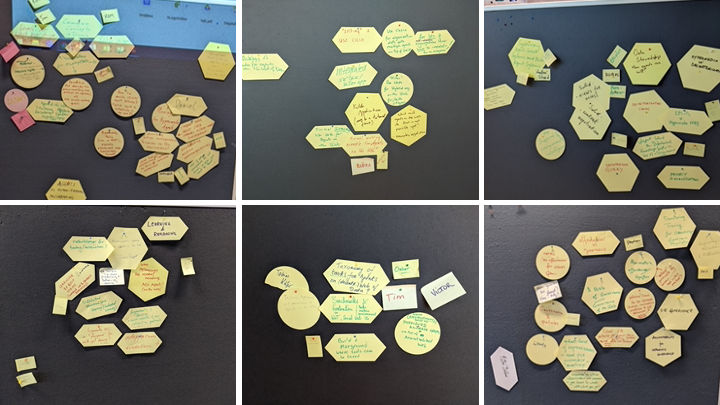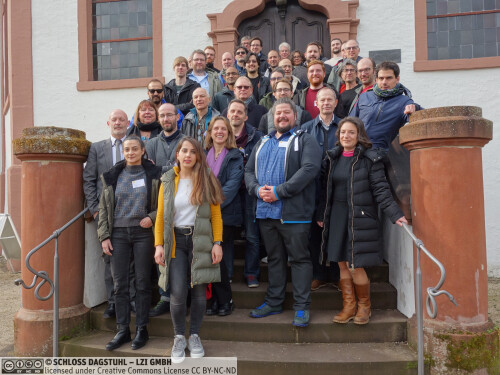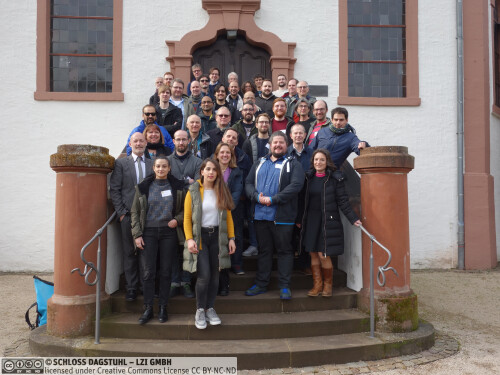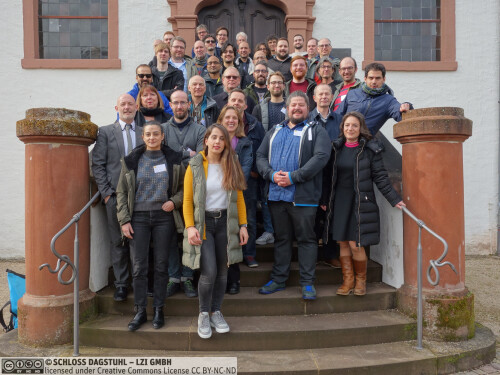Dagstuhl Seminar 23081
Agents on the Web
( Feb 19 – Feb 24, 2023 )
Permalink
Organizers
- Olivier Boissier (Ecole des Mines - St. Etienne, FR)
- Andrei Ciortea (Universität St. Gallen, CH)
- Andreas Harth (Fraunhofer IIS - Nürnberg, DE)
- Alessandro Ricci (Università di Bologna, IT)
Contact
- Marsha Kleinbauer (for scientific matters)
- Jutka Gasiorowski (for administrative matters)
Impacts
- Finding the Critical MAS(S) : Resources and Representations Needed for Weaving a Web that Hosts Linked Multi-Agent Systems - Gandon, Fabien - HAL Inria, 2023. - 3 pp..
- Governing Agents on the Web : Blue Sky Ideas - Charpenay, Victor; Baldoni, Matteo; Ciortea, Andrei; Cranefield, Stephen; Padget, Julian A. - Github, 2023. - 16 pp..
- HyperBrain : Human-inspired Hypermedia Guidance using a Large Language Model : article in HT '23 : Proceedings of the 34th ACM Conference on Hypertext and Social Media - Lemee, Jeremy; Rot, Raffael; Mayer, Simon; Ciortea, Andrei; Ramanathan, Ganesh - New York : ACM, 2023. - pp. 1-5.
- BOLD : A Benchmark for Linked Data User Agents and a Simulation Framework for Dynamic Linked Data Environments - Käfer, Tobias; Charpenay, Victor; Harth, Andreas - Cornell University : arXiv.org, 2023. - 18 pp..
- Supporting Adaptive Multi-Agent Systems with Digital Twins Environments : article in European Conference on Multi-Agent Systems 2023 - Burattini, Samuele - Berlin : Springer, 2023. - pp 445-451 - (Lecture notes in artificial intelligence ; 14282 : article).
- Autonomy in the Age of Knowledge Graphs : Vision and Challenges - Calbimonte, Jean-Paul; Ciortea, Andrei; Kampik, Timotheus; Mayer, Simon; Payne, Terry R.; Zimmermann, Antoine; Tamma, Valentina - Wadern : LZI, 2023. - 22 pp. - (Transactions on Graph Data and Knowledge ; 1. 2023, 1 : article).
- TDD for AOP : Test-Driven Development for Agent-Oriented Programming : article in AAMAS '23: Proceedings of the 2023 International Conference on Autonomous Agents and Multiagent Systems - Amaral, Cleber Jorge; Hübner, Jomi Fred; Kampik, Timotheus - New York : ACM, 2023. - pp. 3038–3040.
- Pody : A Solid-Based Approach to Embody Agents in Web-Based Multi-Agent-Systems - Zimmermann, Antoine; Ciortea, Andrei; Faron, Catherine; Poveda-Villalon, Maria - Berlin : Springer, 2023. - pp 220–229 - (Lecture notes in artificial intelligence ; 14378 : article).
- A Proxy for Assessing the Automatic Encodability of Regulation : article in CSLAW '24: Proceedings of the Symposium on Computer Science and LawMarch - Guitton, Clement; Mayer, Simon; Tamò-Larrieux, Aurelia; Garcia, Kimberly; Fornara, Nicoletta - New York : ACM, 2024. - Pages 121–131.
Schedule
The recent evolution towards hypermedia-driven services, Linked Data, and the Web of Things is turning the Web into a homogeneous hypermedia fabric that interconnects everything - devices, physical objects, documents, or abstract concepts. The latest standards on the Web of Things and (Social) Linked Data allow automated software clients to navigate, query, observe, and act on this uniform hypermedia fabric. Use cases that have long been envisioned for artificial agents on the Web - as published in the original Semantic Web vision in 2001 and going back to the early days of the Internet - are now closer to their practical implementation and deployment. Nevertheless, the engineering of such modern Web-based systems poses research challenges that have yet to be addressed.
Today’s Web-based systems are inherently complex, heterogeneous, and increasingly dynamic (e.g., especially in the context of the Web of Things). Moreover, the World Wide Web was designed to be a decentralized system that spans not only geographical boundaries but also organizational boundaries. In such settings, traditional paradigms for engineering Web-based systems become impractical. Many of the research questions underlying these challenges - such as how to design software agents able to cope with complex and dynamic environments, or how to design and govern interactions in decentralized systems - have been investigated in research on autonomous agents and multi-agent systems. To design a new generation of Web-based systems, we thus need a broader perspective that can only be achieved through a concerted effort of several research communities - which, for the purpose of this seminar, we identified as the communities around Web Architecture and Web of Things, Semantic Web and Linked Data, and Autonomous Agents and Multi-Agent Systems.
The Dagstuhl Seminar 23081 on Agents on the Web continued to investigate the research opportunities identified in the Dagstuhl Seminar 21072 on Autonomous Agents on the Web in order to consolidate the discussions and to continue the transfer of knowledge and results across the involved research communities. Concretely, the seminar pursued the following objectives:
- to identify and align the various research threads in the targeted communities that are relevant for advancing the research on Web-based multi-agent systems;
- to work towards a shared conceptualization and shared theoretical underpinnings for Web-based multi-agent systems;
- to identify representative use cases in different domains that would help demonstrate the potential impact of this joint research effort on society and the economy;
- to evaluate the state of technologies available for prototyping and deploying Web-based multi-agent systems.
The main motivation for this seminar was to consolidate a network of senior and young researchers around the topics. To continue the joint work after the seminar, participants created the W3C Autonomous Agents on the Web (WebAgents) Community Group: https://www.w3.org/community/webagents/
The Seminar Format
The seminar brought together 39 participants across the above-mentioned research communities. The 5-day seminar was a blend of presentations, live demonstrators, and group work structured around three types of sessions:
- presentations of position statements: sessions organized on the first day based on position statements submitted by the seminar participants;
- Demos & Tech sessions: sessions organized on the afternoon of the second day for presenting demonstrators and technologies relevant to the seminar;
- working group sessions: sessions organized throughout the week for focused group work on specific topics identified during the seminar.

The seminar started with presentations of position statements submitted by participants to help bootstrap the discussions. Participants were invited to read all submitted position statements before the seminar and to prepare a 1-minute presentation of their position statements. To help create a narrative throughout the day, a selection of topics was invited for 5-minute presentations. The first day ended with a brainstorming session, in which participants used several concept boards to organize the seminar topics and to form working groups for the rest of the week.
The first half of the second day started with working group sessions, and the afternoon was reserved for the Demos & Tech sessions. The objective of these sessions was to ground the conceptual discussions from the working groups and to paint a picture of what can already be achieved with existing technologies. In total, these sessions attracted 16 demonstrators, out of which 7 or the full report (see Section 4 of the full report).
The rest of the week continued with working group sessions. Beginning of each day, participants were invited to pitch new ideas for working groups. In addition, a synchronization session was organized in the middle of the week to review the progress, reinforce bridges across working groups, and reorganize the working groups if needed. In total, seven working groups were created and their consolidated discussion summaries are presented in Section 5 of the full report.
 Olivier Boissier, Andrei Ciortea, Andreas Harth, and Alessandro Ricci
Olivier Boissier, Andrei Ciortea, Andreas Harth, and Alessandro Ricci
The World Wide Web has emerged as the application layer of choice for most distributed systems envisioned on the Internet. The evolution towards Hypermedia APIs, Linked Data, and the Web of Things is turning hypermedia into a homogeneous information fabric that interconnects heterogeneous Resources - devices, physical objects, information resources, abstract concepts, etc. The latest standards allow automated software clients to navigate, query, observe, and act on this hypermedia fabric in a reliable manner. Use cases that have long been envisioned for artificial agents on the Web - as published in the original Semantic Web vision in 2001 and going back to the early days of the Internet - are now closer to their practical implementation and deployment. Nevertheless, the engineering of such modern Web-based systems poses research challenges that have yet to be addressed.
Today’s Web-based systems are inherently complex, heterogeneous, and increasingly dynamic (e.g., in particular in the context of the Web of Things). Moreover, the World Wide Web is inherently decentralized, designed to span not only geographical boundaries but also organizational boundaries. In such settings, traditional paradigms for engineering Web-based systems become impractical. Many of the research questions underlying these challenges - such as how to balance goal-directed and reactive behavior, or how to design and govern interactions in decentralized systems - have been investigated in the scientific literature on autonomous agents and multi-agent systems. Thus, this research needs to take a broader perspective that can only be achieved through a concerted effort of the research communities around Web Architecture and the Web of Things, Semantic Web and Linked Data, and Autonomous Agents and Multi-Agent Systems.
This Dagstuhl Seminar aims to consolidate and further investigate the research opportunities identified in the Dagstuhl Seminar 21072 (Autonomous Agents on the Web) , and to continue the transfer of knowledge and results across the involved research communities. We believe this seminar can break new ground in all these areas of research - and can help pave the way for a new generation of Web-based autonomous systems composed of people and intelligent agents interacting and collaborating through the Web. Concretely, the seminar will pursue the following objectives:
- to identify and align the various research threads in the targeted communities that are relevant for advancing the research on Web-based autonomous systems;
- to work towards a shared conceptualization and shared theoretical underpinnings for Web-based autonomous systems;
- to identify representative use cases in different domains that would help demonstrate the potential impact of this joint research effort on society and economy;
- to evaluate the state of technologies available for prototyping and deploying Web-based autonomous systems.
 Olivier Boissier, Andrei Ciortea, Andreas Harth, and Alessandro Ricci
Olivier Boissier, Andrei Ciortea, Andreas Harth, and Alessandro Ricci
- Cleber Jorge Amaral (Federal Institute of Santa Catarina - São José, BR) [dblp]
- Matteo Baldoni (University of Turin, IT) [dblp]
- Olivier Boissier (Ecole des Mines - St. Etienne, FR) [dblp]
- Samuele Burattini (University of Bologna, IT)
- Jean-Paul Calbimonte (HES-SO Valais - Sierre, CH) [dblp]
- Pierre-Antoine Champin (INRIA - Sophia Antipolis, FR) [dblp]
- Victor Charpenay (Mines Saint-Étienne, FR) [dblp]
- Amit K. Chopra (Lancaster University, GB) [dblp]
- Andrei Ciortea (Universität St. Gallen, CH) [dblp]
- Rem Collier (University College Dublin, IE) [dblp]
- Stephen Cranefield (University of Otago, NZ) [dblp]
- Mehdi Dastani (Utrecht University, NL) [dblp]
- Kemal A. Delic (The Open University - Milton Keynes, GB) [dblp]
- Jérôme Euzenat (INRIA Grenoble Rhône-Alpes, Saint Ismier, FR & Univ. Grenoble-Alpes, FR) [dblp]
- Catherine Faron (Université Côte d’Azur - Sophia Antipolis, FR)
- Nicoletta Fornara (University of Lugano, CH) [dblp]
- Fabien Gandon (INRIA - Sophia Antipolis, FR) [dblp]
- Wendy Hall (University of Southampton, GB) [dblp]
- Andreas Harth (Fraunhofer IIS - Nürnberg, DE) [dblp]
- Jomi Fred Hübner (Federal University of Santa Catarina, BR) [dblp]
- Tobias Käfer (KIT - Karlsruher Institut für Technologie, DE) [dblp]
- Timotheus Kampik (Umeå University, SE & SAP Signvavio - Berlin, DE) [dblp]
- Matthias Kovatsch (Siemens Schweiz AG - Zug, CH) [dblp]
- Brian Logan (University of Aberdeen, GB & Utrecht University, NL) [dblp]
- Stefano Mariani (University of Modena, IT) [dblp]
- Simon Mayer (Universität St. Gallen, CH) [dblp]
- Mahda Noura (TU Chemnitz, DE) [dblp]
- Eoin O'Neill (University College Dublin, IE) [dblp]
- Julian Padget (University of Bath, GB) [dblp]
- María Poveda-Villalón (Technical University of Madrid, ES) [dblp]
- Dave Raggett (W3C - United Kingdom, GB) [dblp]
- Alessandro Ricci (Università di Bologna, IT) [dblp]
- Sebastian Schmid (Universität Erlangen-Nürnberg, DE)
- Daniel Schraudner (Universität Erlangen-Nürnberg, DE) [dblp]
- Munindar P. Singh (North Carolina State University - Raleigh, US) [dblp]
- Ruben Taelman (Ghent University, BE) [dblp]
- Danai Vachtsevanou (Universität St. Gallen, CH) [dblp]
- Jan Van den Bussche (Hasselt University, BE) [dblp]
- Antoine Zimmermann (Ecole des Mines - St. Etienne, FR) [dblp]
Related Seminars
- Dagstuhl Seminar 21072: Autonomous Agents on the Web (2021-02-14 - 2021-02-19) (Details)
Classification
- Artificial Intelligence
- Multiagent Systems
- Other Computer Science
Keywords
- Web Architecture
- Web of Things
- Linked Data
- Semantic Web
- Multi-Agent Systems




 Creative Commons BY 4.0
Creative Commons BY 4.0
